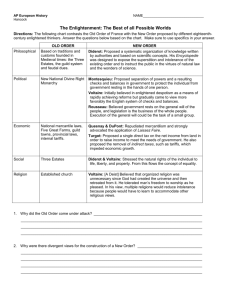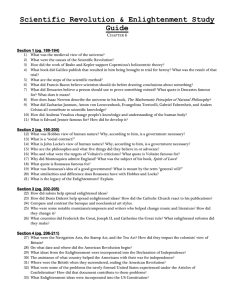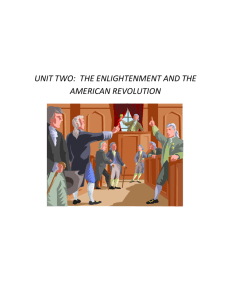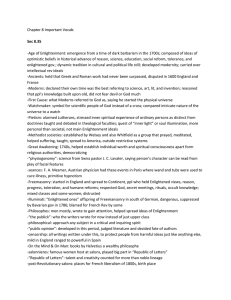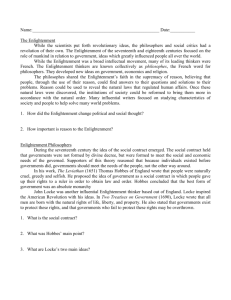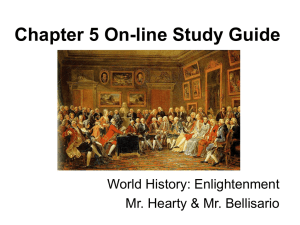The Enlightenment - Mr. Darby's History
advertisement
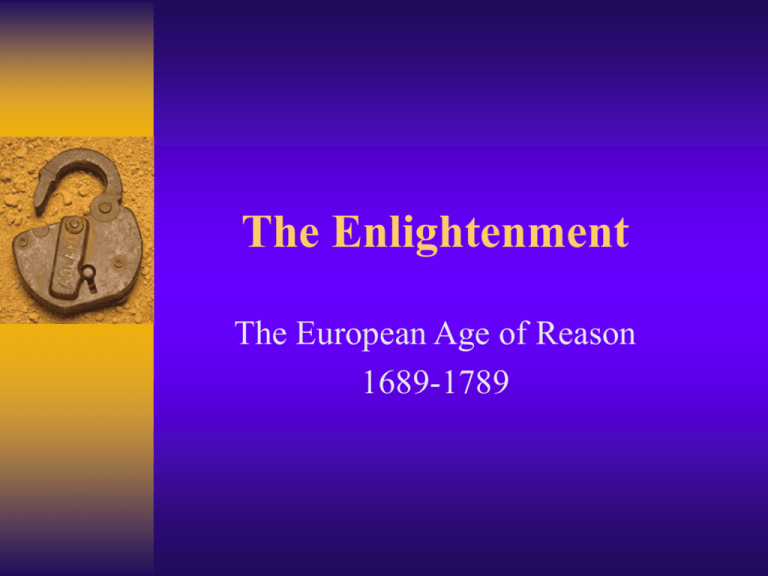
The Enlightenment The European Age of Reason 1689-1789 Origins of the Enlightenment The ideals of humanism from the Renaissance permeate society. Rediscovery of classical texts influences the new philosophers. The Scientific Revolution convinces many that the world can be understood through natural laws. The Wars of Religion persuade many that toleration is the only way for civilization to survive. The Doctrine of Progress Philosophes believed in the progress of human beings. Human beings were basically good, but corrupted by society; therefore, human institutions needed reform Marquis de Condorcet (1743-1794) made argument in Progress of the Human Mind John Locke (1632-1704) Two Treatises on Civil Government:justified supremacy of Parliament; natural rights Essay Concerning Human Understanding (1690): tabula rasa (“blank slate”) – considered one of most important Enlightenment works – all human knowledge is the result of sensory experience: thus, human progress is in the hands of society—education! Deism secular world view: first time in human history; marked end of age of religion natural science and reason deism: God created universe and then stepped back and left it running (like a clock) – prime mover Grew out of Newton’s theories regarding natural law Thomas Paine, Age of Reason: advocates deism Voltaire also advocated deism over Christianity. Voltaire (1694-1778) François Marie Arouet Ardent critic of the Old Regime Wrote essays, letters, plays. Candide (1759) satire criticizing religious persecution and superstition. Voltaire in England Voltaire in imprisoned in France after his ideas offend French authorities. He lived in England from 1726 to 1729. He comes to admire the English toleration of political ideas and religion. Returning to France, he published Letters on the English (1733), admiring English constitutionalism and criticizing French absolutism. Voltaire in England Voltaire and Tolerance Voltaire supported toleration in religion and politics, an idea he saw in practice in England. Voltaire defended Jean Calas, a Hugeunot accused of murdering his son lest he convert to Catholicism. He published his Treatise on Tolerance in 1763, convincing authorities to reverse their conviction of Calas in 1765. The Enlightened Despots Catherine the Great Least “enlightened” of the Enlightened Despots westernization: architecture, sculpture, music--supported philosophes reforms:reduced torture, limited religious toleration, some education improvement, increased local control The Enlightened Despots Joseph II (1765-1790) – greatest of the Enlightened despots (“greatest good for greatest number”) Abolished serfdom in 1781, freedom of press, freedom of religion & civic rights, more equitable justice system, made German official language (to assimilate minorities), increased control over Catholic education, expanded state schools, left empire in economic and political turmoil: Leopold I rescind many laws (e.g., serfdom) The Enlightened Despots Frederick the Great – Became a reformer during 2nd half of his reign; ruler was the “first servant of the state” – Religious freedom, education in schools and universities, codified laws, promoted industry and agriculture, encouraged immigration – Social structure remained heavily stratified: serfdom; extended privileges for the nobility, Junkers became heart of military; difficult upward mobility for middle class leadership. Baron de Montesquieu (1689-1755) French attorney and philosophe. Believed in no single political system. In Spirit of the Laws (1748) advocated separation of powers amongst executive, legislative, and judicial branches. Diderot and the Encyclopedia Denis Diderot (1718- 1784) edited the Encyclopedia published in 28 vols. Between 1751 and 1772. Voltaire, Rousseau and Montesquieu contributed articles. Jean-Jacques Rousseau (1712-1778) Born in Geneva to Calvinist family He believed rationalism and civilization was destroying rather than liberating the individual; emphasized nature, passion— influenced early Romantic movement Jean-Jacques Rousseau Natural Education – Rousseau believed that in there natural state, humans were virtuous, free, equal, and happy. – Civilization had corrupted them. – Natural education would free children of corruption – Set forth ideas in Emile (1762). – Children would learn through experience (nature, emotional experience), not books. Jean-Jacques Rousseau General Will – Rousseau advocated radical contract form of government in The Social Contract (1762) – Desired freedom, but rejected individualism and focused on his role in society. – People’s opinion would form the “general will” to be carried out by a small government. – He did not favor democracy, but felt that sovereignty laid in the people. Economic Philosophes François Quesnay (1694-1774) – “physiocrats”: opposed to mercantilist economic theory. advocated reform of the agrarian order. Adam Smith (17271790): Wealth of Nations (1776): The “Bible” of capitalism; laissez faire “let do” François Quesnay Women Philosophes Gender theory: women played important role in organizing salons. Salons of Madame de Geoffren and Louise de Warens Mary Wollstonecraft – Vindication of the Rights of Women (1792) Mary Wollstonecraft The Later Enlightenment: Baron Paul d’Holbach (1723-1789): humans were machines governed by outside forces – freewill, God, and immortality of soul were foolish myths – severe blow to unity of the Enlightenment David Hume (1711-76): emphasized limitations of human reasoning (similar to Rousseau) – human mind is nothing but a bundle of impressions; later became dogmatic skeptic that undermined Enlightenment Immanuel Kant (1724-1794): Separated science and morality into separate branches of knowledge. – Science could describe natural phenomena of material world but could not provide a guide for morality
